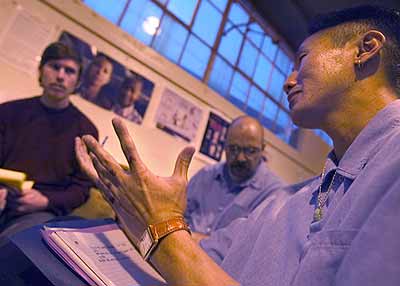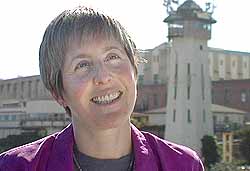Berkeleyan
 |
Inside the walls of San Quentin, inmates take college courses taught by grad students from Berkeley and other Bay Area schools. (Brian Frank photo) |
The promise of higher education at San Quentin
Haas Public Service Award recipient Jody Lewen to deliver Cal Day lecture
![]()
| 18 April 2007
Violent crime pervades movies, TV programming, the music scene, and video games. The more grisly the act, it seems, the more attracted we are - as if to confirm that we, after all, are good; only criminals do horrific things.
It's this belief that Berkeley alumna Jody Lewen '02 confronts each day as director of the Patten University extension site at San Quentin State Prison. This free, on-site program, unique within California's vast state penal system, enables prisoners (68 so far, come June) to earn an associate of arts degree in liberal arts. Initiated after a 1994 congressional act excluded prisoners from receiving Pell Grants, the program is funded through the Prison University Project, which Lewen founded and directs.
 Jody Lewen outside San Quentin State Prison. (Dan Krauss photo) |
On Cal Day this Saturday, April 21, Chancellor Birgeneau will present Lewen with Berkeley's Peter E. Haas Public Service Award, honoring her contributions to creative social change. The ceremony begins at 10:30 a.m. in the Morrison Library in Doe Library; a lecture by Lewen, "The Promise of Higher Education at San Quentin," will follow.
While studying for her Ph.D. in rhetoric at Berkeley in 2002, Lewen became a volunteer instructor with the AA-degree college program at San Quentin. After years of immersion in literary theory, working behind bars at first came as a shock for Lewen. Subconsciously she expected the prisoners to be callous if not sadistic, she says - yet inside San Quentin's gates she met intelligent, compassionate, and funny men.
It was this contrast that inspired Lewen's efforts to not only provide quality education behind bars but work with diverse interest groups toward genuine reform of California's prison system - which with nearly 173,000 inmates has the largest state-prison population in the nation (with the highest post-release recidivism rate).
"Changing the criminal-justice system has everything to do with how we perceive criminals," Lewen says. "We tend to oversimplify people in prison as evil incarnate, but they are human beings with complex, diverse histories, characters, emotions, and thoughts. They may seem like an abstraction, but they deal with the same life issues that we do."
Breaking down barriers
Lewen faces a litany of daily obstacles in her work: a shoestring budget, space constraints, heavy dependence on donated books, and the history of antagonism between key groups she interacts with, such as the prison guards' union and the Department of Corrections and Rehabilitation.
"Historically, the California Correctional Peace Officers Association has not engaged in significant dialogue with other interest groups," says Chuck Alexander, executive vice president of the CCPOA. "Thanks solely to Dr. Lewen and her zeal for an improved correctional system, we now meet regularly."
Lewen's greatest support comes from the 70-some teachers, teaching assistants, and tutors who offer the program's classes each semester. Most are graduate students at Bay Area universities - about 70 percent from Berkeley - and all provide their services as volunteers.
'A fresh start'
People frequently ask why convicts should get a free education when so many others don't. It's a tough question - and yet the cost of educating prisoners is negligible compared to the cost of running prisons. Research shows that education is a predictor of job retention, and job retention reduces recidivism. "If we can get prisoners in the door and through the classes enough to improve their basic life skills, that may be the best service we can offer them," Lewen says.
The college program offers about 12 classes each semester in the humanities, math, and physical and social sciences, as well as college-preparatory classes and pre-release academic advising. Students gain critical-thinking skills, writing competency, and subject-matter knowledge - and in the process begin to see themselves differently, says Amy Lerman, a Berkeley Ph.D. candidate in political science and a volunteer instructor at San Quentin. "For many, the program represents a fresh start, and returning to school provides a chance to finally redefine who they are and who they want to be."
"Before my educational experience at San Quentin, I would have never seen in my wildest dreams the metamorphosis that has taken place within me," the program's 2006 valedictorian, Bobby Evans, said in his graduation address. "I credit education for showing me that I do have what it takes to be a better citizen, and a better father, with much to contribute to society." When Evans is released, he hopes to become a social worker to help others like him reenter their communities as productive citizens.
Lewen received the Chancellor's Community Service Award in 2002. The Haas Public Service Award honors her efforts to change the culture of the California prison system. For more information on Lewen and the Haas Award, see urel.berkeley.edu/haasawards.

